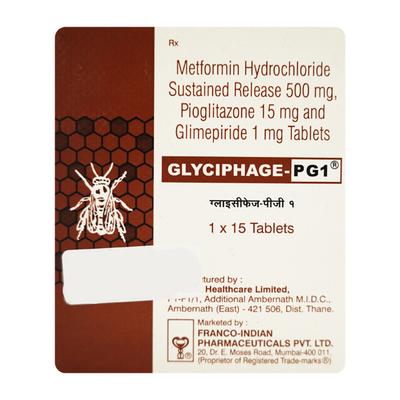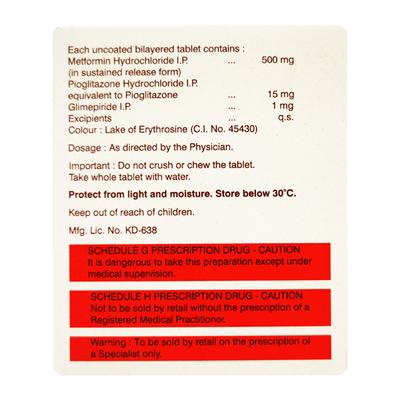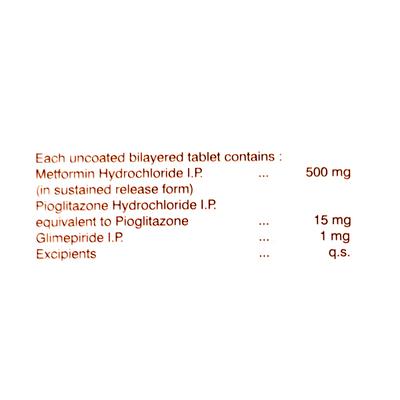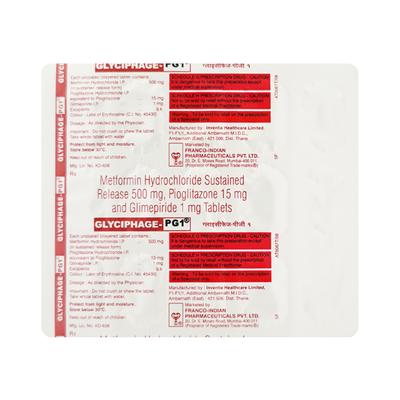

Netmeds First Membership
Quick Links
Introduction About GLYCIPHAGE PG 1MG TABLET
GLYCIPHAGE PG 1MG TABLET is used to manage type II diabetes mellitus when diet, exercise and management with single agent does not result in adequate sugar control. It is a combination of Glimepiride, Metformin and Pioglitazone which belongs to the group of medicines called Antidiabetic agents.
Before taking GLYCIPHAGE PG 1MG TABLET, inform your doctor if you have any liver, kidney or heart problems. You must also inform your doctor if you have any eye problems, hormonal imbalance, alcoholism, or if you are malnourished, starved, on an irregular diet as a precaution. It is strictly not recommended for use in patients with type I diabetes mellitus, bladder cancer, severe heart failure or lactic acidosis.
Along with the management, follow the diet and lifestyle changes advised by your doctor to achieve better results. Avoid smoking and consumption of alcohol while taking the medicine as it may aggravate the existing condition. The most common side effects are low blood sugar levels, nausea, stomach upset, constipation, sore throat, muscle pain, headache, dizziness and weight gain. Consult your doctor if any of these side effect worsens.
Uses Of GLYCIPHAGE PG 1MG TABLET
- Used to manage type II diabetes mellitus
How GLYCIPHAGE PG 1MG TABLET Works
GLYCIPHAGE PG 1MG TABLET stimulates the pancreas to secrete more insulin (a hormone involved in glucose metabolism). It also makes our body more sensitive to insulin which helps in digesting the circulating sugars (glucose) in the blood, thereby reducing blood sugar levels. Additionally, it can also reduce the glucose produced by the liver and reduces its absorption in the body.
How to use GLYCIPHAGE PG 1MG TABLET
- Take GLYCIPHAGE PG 1MG TABLET preferably after meals or as advised by your physician
- Swallow the medicine with a glass of water. Do not crush or chew the medicine
- Your doctor will decide the correct dose and duration of therapy for you depending upon your age, body weight and disease condition
- Do not stop taking GLYCIPHAGE PG 1MG TABLET unless your doctor advice you to stop
Side Effects Of GLYCIPHAGE PG 1MG TABLET
Common side effects of GLYCIPHAGE PG 1MG TABLET:
- hypoglycemia (low blood sugar levels)
- diarrhea, stomach pain, loss of appetite, flatulence
- changes in taste, metallic taste
- joint pain, back pain, muscle pain
Stop taking GLYCIPHAGE PG 1MG TABLET and contact your doctor immediately if you experience any of the following side effects:
- signs of lactic acidosis (cold hands or feet, dizziness or light-headedness, slow or irregular heartbeat, weakness or tiredness, unusual muscle pain, trouble breathing, sleepiness or drowsiness, stomach pains, nausea or vomiting)
- symptoms of heart failure (such as unusual shortness of breath or trouble in breathing, rapid increase in weight or localised swelling (oedema), especially in the ankles or legs, unusual tiredness)
- signs and symptoms of bladder cancer (blood in your urine, pain while urinating or urgent need to pee)
- increased risk of fractures (especially in the bones of hand, upper arm, or foot in women)
- blurred vision due to swelling at the back of the eye or worsening of existing blurred vision
- serious allergic reaction (hives, swelling of the face, lips, tongue or throat causing difficulty in breathing or swallowing)
- signs of liver problems (nausea or vomiting, stomach pain, unusual or unexplained tiredness, loss of appetite, dark urine, yellowing of the skin or the whites of the eyes)
Warning & Precautions
Pregnancy
Consult your doctorThere are no adequate human data to determine the safety of GLYCIPHAGE PG 1MG TABLET during pregnancy.
Breastfeeding
Consult your doctorIt is not known if GLYCIPHAGE PG 1MG TABLET passes into human milk and if it can harm your baby. Talk to your doctor about the best way to control your blood glucose levels while breastfeeding.
Driving and Using Machines
Use with CautionDo not drive or operate any heavy tools or machines if your ability is affected by GLYCIPHAGE PG 1MG TABLET.
Alcohol
Consult your doctorAvoid consumption of alcohol while taking GLYCIPHAGE PG 1MG TABLET as it may increase the risk of unwanted side effects.
Kidney
Consult your doctorGLYCIPHAGE PG 1MG TABLET is not recommended for use in patients with severe kidney problems. It should be used with caution in patients with other kidney problems.
Liver
Consult your doctorGLYCIPHAGE PG 1MG TABLET is not recommended for use in patients with severe liver problems. It should be used with caution in patients with other liver problems.
Allergy
ContraindicatedDo not take GLYCIPHAGE PG 1MG TABLET if you are allergic to Glimepiride, Metformin, Pioglitazone or to any other ingredients of this medicine.
Heart Disease
Consult your doctorGLYCIPHAGE PG 1MG TABLET is not recommended for use in patients with severe heart problems (such as heart failure). It should be used with caution in patients with other heart problems.
Use In Pediatrics
ContraindicatedGLYCIPHAGE PG 1MG TABLET is not recommended for use in children and in adolescents (aged below 18 years).
Use In Geriatrics
Use with CautionGLYCIPHAGE PG 1MG TABLET should be used with caution in elderly patients (aged above 65 years).
Others
It is not recommended for use if you:
- have type I diabetes mellitus (insulin dependent diabetes)
- have lactic acidosis (build-up of lactic acid in the body)
- have diabetic ketoacidosis
- have bladder cancer
- pass bloody urine
Before taking GLYCIPHAGE PG 1MG TABLET, inform your doctor if you:
- are recovering from any injury, operation, infections or from any form of stress
- have G6PD deficiency
- are on fating or malnourished, starved, on an irregular diet, or feeling weak
- perform extreme physical exercises without proper carbohydrate intake
- are severely dehydrated
- have hormonal problems
- have edema (swelling of body parts)
- smoke
- have special type of diabetic eye disease called macular oedema
- have cysts on your ovaries (polycystic ovarian syndrome)
- previously had stroke
- have anemia
- have any bone problems or at risk of developing bone fractures
- are a premenopausal woman
- have thyroid problems
Interactions
A. Drug-Drug Interactions:
Before taking GLYCIPHAGE PG 1MG TABLET, inform your doctor if you are taking any of the following medicines:
- Antidiabetics (Ex. teneligliptin, rosiglitazone, insulin, gliclazide)
- Non-steroidal anti-inflammatory agents (Ex. aspirin, ibuprofen, celecoxib, phenylbutazone, azopropazone, oxyphenbutazone)
- Antibiotics (Ex. amikacin, nitrofurantoin, sulfamethoxazole, tetracyclines, chloramphenicol, ciprofloxacin, clarithromycin, Trimethoprim)
- Antifungals (Ex. fluconazole, miconazole, isuvaconazole)
- Anticoagulants (Ex. warfarin)
- Hormone replacement therapy (Ex. testosterone)
- Antidepressants (Ex. moclobemide, isocarboxazid, phenelzine, tranylcypromine, fluoxetine, chlorpromazine, prochlorperazine, lithium)
- Anti-lipidemic agents (Ex. fenofibrate, nicotinic acid, colesevelam)
- Antihypertensives (Ex. enalapril, lisinopril, ramipril, atenolol, propranolol, telmisartan, olmesartan, clonidine, guanethidine and reserpine)
- Anti-arrhythmic agent (Ex. Disopyramide)
- Anti-gout agents (Ex. allopurinol, probenecid, sulfinpyrazone)
- Anti-cancer agents (Ex. cyclophosphamide, ifosfamide, trofosfamide, vandetanib, crizotinib and olaparib)
- Hemorrheologic agents (Ex. Pentoxifylline)
- Enzyme inhibitor (Ex. tritoqualine)
- Alpha blockers (Ex. prazosin, doxazosin)
- Hormonal replacement therapy (Ex. estradiol)
- Thiazide diuretics (Ex. hydrochlorothiazide)
- Hormones (Ex. Levothyroxine)
- Corticosteroids (Ex. prednisolone, betamethasone)
- Bronchodilators (Ex. salbutamol, terbutaline)
- Alpha- and beta-adrenergic agonists (Ex. Adrenaline)
- Laxatives (Ex. lactulose, liquid paraffin)
- Anticonvulsants (Ex. phenytoin, Fenfluramine)
- Barbiturates (Ex. phenobarbital)
- Carbonic anhydrase inhibitor (Ex. acetazolamide)
- H2 blockers (Ex. Cimetidine)
- Anti-TB agents (Ex. Rifampicin)
- HIV integrase inhibitors (Ex. Dolutegravir)
- Anti-anginal (Ex. Ranolazine)
Overdosage:
If you or anyone else accidentally took more GLYCIPHAGE PG 1MG TABLET, you may experience the signs of hypoglycemia (such as increased hunger, sweating, headache, feeling clammy, restless or aggressive, shakiness, fast heartbeat and confusion). To manage this, consume any sugary food immediately. If the symptom did not improve or worsens contact your doctor immediately. Other symptoms of overdosage might include vomiting, stomach pain with muscle cramps, feeling generally unwell with severe tiredness and difficulty in breathing.
Synopsis
| Drug | : | Glimepiride, Metformin, Pioglitazone |
| Pharmacological Category | : | Sulfonylureas, Biguanides, PPAR-gamma and PPAR-alpha agonist |
| Therapeutic Indication | : | Type II diabetes mellitus |
| Dosage Forms | : | Tablet |
More Information
FAQs About GLYCIPHAGE PG 1MG TABLET
Q: What is GLYCIPHAGE PG 1MG TABLET used for?
A: GLYCIPHAGE PG 1MG TABLET is an antidiabetic medicine used to manage type II diabetes mellitus when diet, exercise and management with single agent does not result in adequate response.
Q: How and when to take GLYCIPHAGE PG 1MG TABLET?
A: Take GLYCIPHAGE PG 1MG TABLET preferably after meals or as advised by your physician. Swallow the medicine with a glass of water. Do not crush or chew the medicine. Your doctor will decide the correct dose and duration of therapy for you depending upon your age, body weight and disease condition.
Q: How long should I take GLYCIPHAGE PG 1MG TABLET?
A: You need to take GLYCIPHAGE PG 1MG TABLET as long as your doctor or physician prescribes you the medicine. Your doctor will decide the correct dose and duration of therapy for you depending upon your age, body weight and disease condition.
Q: What is the best time to take GLYCIPHAGE PG 1MG TABLET?
A: GLYCIPHAGE PG 1MG TABLET must be taken with meals to avoid gastrointestinal side effects.
Q: What to do if I forgot to take a dose of GLYCIPHAGE PG 1MG TABLET?
A: If you forgot to take a dose of GLYCIPHAGE PG 1MG TABLET, take it as soon as you remember. However, if it is time for the next dose of GLYCIPHAGE PG 1MG TABLET, skip the missed dose and take the next one regularly.
Q: Can I stop taking GLYCIPHAGE PG 1MG TABLET without consulting your doctor?
A: No. You should not stop taking GLYCIPHAGE PG 1MG TABLET without consulting your doctor because it may lead to reversal of symptoms.
Q: Will taking a higher dose of GLYCIPHAGE PG 1MG TABLET be more effective?
A: No, taking a higher dose of GLYCIPHAGE PG 1MG TABLET will not be effective, rather it can lead to toxicity. Always take the dose prescribed by your doctor. If the prescribed dose is not effective for you, consult your doctor for advice. Your doctor might increase the dose or suggest an alternative therapy.
Q: Can I take medication for high blood pressure along with GLYCIPHAGE PG 1MG TABLET?
A: It is not advisable to take medicines to control blood pressure while taking GLYCIPHAGE PG 1MG TABLET without consulting your doctor, as they have known interactions with GLYCIPHAGE PG 1MG TABLET.
Q: How to manage the side effects of GLYCIPHAGE PG 1MG TABLET?
A: Low blood sugar is a common side effect of taking GLYCIPHAGE PG 1MG TABLET. Try to have sugar rich food items such as fruit juice, glucose tablets or gel, soft drinks, honey or sugary candy. Check your blood sugar after 10 minutes. If not gained optimum level, take another sugary snack, or drink, and check the blood sugar levels once again. If your condition did not improve, consult your doctor immediately.
Q: Can GLYCIPHAGE PG 1MG TABLET be taken with insulin?
A: Co-administration of GLYCIPHAGE PG 1MG TABLET with insulin is considered risky as they can increase the chances of hypoglycemia (low blood sugar levels). Therefore, consult your doctor before taking it.
Q: Does GLYCIPHAGE PG 1MG TABLET cause weight gain?
A: Yes. GLYCIPHAGE PG 1MG TABLET may cause weight gain in some individuals. To avoid this, follow a healthy diet and regular physical activity as advised by your physician. However, if you experience any weight gain due to swelling of body parts (such as in face, legs, or hands), consult your doctor immediately.
Q: What are the side effects of taking GLYCIPHAGE PG 1MG TABLET?
A: The most common side effects of taking GLYCIPHAGE PG 1MG TABLET are low blood sugar levels, nausea, stomach upset, constipation, sore throat, muscle pain, headache, dizziness and weight gain. Consult your doctor if any of these side effect worsens.
References
1. KD. Tripathi. Insulin, Oral Hypoglycaemic Drugs and Glucagon. Essentials of medical pharmacology. Seventh edition. 2013. Page – 270, 275 & 277.
2. Jeong Mi Kim, Sang Soo Kim, Jong Ho Kim, Mi Kyung Kim, Tae Nyun Kim, Soon Hee Lee, Chang Won Lee, Ja Young Park, Eun Sook Kim, Kwang Jae Lee, Young Sik Choi, Duk Kyu Kim and In Joo Kim. NIH. National Library of Medicine. National Center for Biotechnology Information. PMC. PubMed Central. July 2019. [Accessed on 9th January 2023] click here
3. Brown & Burk UK Limited. Electronic Medicines Compendium (EMC). [Revised in December 2020] [Accessed on 9th January 2023] click here
4. Milpharm Limited. Electronic Medicines Compendium (EMC). [Revised in June 2020] [Accessed on 9th January 2023] click here
5. Rx Farma Limited. Electronic Medicines Compendium (EMC). [Revised in September 2019] [Accessed on 9th January 2023] click here
6. Gerard Laboratories. Electronic Medicines Compendium (EMC). [Revised in August 2020] [Accessed on 9th January 2023] click here
7. Cipla Ltd. TRIEXER ER Tablets (Glimepiride + Pioglitazone hydrochloride + Metformin hydrochloride). Ciplamed. [Revised in September 2020] [Accessed on 9th January 2023] click here
8. Central Drugs Standard Control Organization. FDC of Glimepiride (1mg/2mg) + Pioglitazone (15mg) + Metformin (500mg E.R) Tablet. August 2005. [Accessed on 9th January 2023] click here











